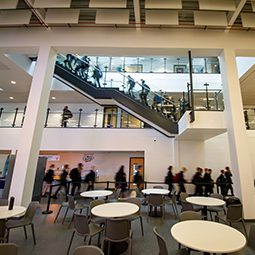Key Stage 4
Please be aware that the proposed options are for illustrative purposes. Options offered will be determined by student preferences, staffing expertise and capacity.
ENGLISH – Part of the core curriculum
| Title of qualification | GCSE English Language and English Literature |
| Examination board & specification | AQA |
| Assessment | English Language Paper 1: Explorations in Creative Reading and Writing (Fiction from the 20th or 21st century) Paper 2: Writers’ Viewpoints and Perspectives (Literary non-fiction from the 19th and 20th or 21st century) English Literature Paper 1: Shakespeare and the Nineteenth Century Novel (Macbeth and A Christmas Carol or The Strange Case of Dr Jekyll and Mr Hyde) Paper 2: Modern Texts (An Inspector Calls) and Poetry (a cluster of poetry from the AQA Anthology (Power and Conflict) and unseen poetry Non-examination Assessment: Spoken Language Endorsement Pupils will give a teacher assessed presentation on which they will answer questions. They will be graded Distinction, Merit, Pass or Fail. This does not count towards the GCSE examination. |
| Examination entry | Grade 9-1 |
| Year 10 and 11 Overview | In Year 10 and 11 students will build on the body of knowledge from key stage 3 to: Read, understand and respond to texts maintaining a critical style and developing an informed personal response.Use textual references, including quotations, to support and illustrate quotations.Show understanding of the relationship between texts and the contexts in which they were written.Communicate clearly, effectively and imaginatively, selecting and adapting tone, style and register for different forms, purposes and audiencesOrganise information and ideas, using structural and grammatical features to support coherence and cohesion of texts |
MATHEMATICS – Part of the core curriculum
| Title of qualification | GCSE Mathematics |
| Examination board & specification | Edexcel (1MA1) |
| Assessment | 100% Examination, each examination will have a range of question types. Paper 1: No Calculator is allowed. (90 minutes) Paper 2: Calculator is allowed. (90 minutes) Paper 3: Calculator is allowed. (90 minutes) |
| Examination entry | Grade 9-1 |
| Year 10 and 11 Overview | Pupils will study the following units over the GCSE: Number, Algebra, Ratio, Proportion and Rates of change, Geometry and Measures, Probability, Statistics |
SCIENCE – DOUBLE – Part of the core curriculum (although some students may opt for Triple Science)
| Title of qualification | Double GCSE Science |
| Examination board & specification | AQA |
| Assessment | Pupils will sit two exams in each subject (six exams in total). Each exam will be 1 1/4 hours. Pupils will be entered for Higher (levels 4-9) or Foundation (1-5). Pupils will receive two grades for their overall performance across all exams (e.g. 8-9). They will not receive individual grades for each subject. |
| Examination entry | Grade 9-1 |
| Year 10 and 11 Overview | Biology: Cells and Organisation, Plant Biology, RespirationInfection and response, Ecosystems, Humans and the environment, Homeostasis, Inheritance, Evolution Chemistry: Atomic structure and the periodic table, The reactivity of metals Organic Chemistry, Chemistry of the Atmosphere, Energy in Reactions, Quantitative Chemistry, Structure and Bonding, Acids and electrolysis, Purity and formulations, Resources and potable water, Chemical Equilibrium Physics: Energy and dissipation, Energy transfer by heating and Energy resources, Electric circuits, Electricity at home, Particle model of matter, Atomic Structure, Forces, Forces and pressure, Light and Waves, Electromagnetism, Space |
SCIENCE – TRIPLE – Option
| Title of qualification | GCSE Biology |
| Year 9 Overview | Cells (bridging unit), Cells (GCSE Biology), Organisation |
| Examination board & specification | AQA |
| Assessment | Pupils will sit two exams. Each exam will be 1 3/4 hours. Pupils will be entered for Higher (levels 4-9) or Foundation (1-5). Pupils will receive one grade for their overall performance across both exams. |
| Examination entry | Grade 9-1 |
| Year 10 and 11 Overview | Biology: Cells and Organisation, Plant Biology, Respiration, Infection and response, Ecosystems, Humans and the environment, Homeostasis, Inheritance, Evolution |
| Title of qualification | GCSE Chemistry |
| Examination board & specification | AQA |
| Assessment | Pupils will sit two exams. Each exam will be 1 3/4 hours. Pupils will be entered for Higher (levels 4-9) or Foundation (1-5). Pupils will receive one grade for their overall performance across both exams. |
| Examination entry | Grade 9-1 |
| Year 10 and 11 Overview | Atomic structure, Organic Chemistry, Chemistry of the Atmosphere, Energy in Reactions, Structure and Bonding, Acids and electrolysis, Purity and formulations, Resources and potable water, Chemical Equilibrium |
| Title of qualification | GCSE Physics |
| Examination board & specification | AQA |
| Assessment | Pupils will sit two exams. Each exam will be 1 3/4 hours. Pupils will be entered for Higher (levels 4-9) or Foundation (1-5). Pupils will receive one grade for their overall performance across both exams. |
| Examination entry | Grade 9-1 |
| Year 10 and 11 Overview | Electric circuits, Electricity at home, Particle model of matter, Atomic Structure, Forces in balance, Forces and motion, Forces and pressure, Waves, Light, Electromagnetism, Space |
RELIGIOUS STUDIES – Part of the core curriculum
| Title of qualification | GCSE Religious Studies A |
| Examination board & specification | AQA |
| Assessment | Paper 1: The study of religions: beliefs, teachings and practices Paper 2: Thematic Studies |
| Examination entry | Grade 9-1 |
| Year 10 and 11 Overview | Christian Beliefs, Christian Practices, Islamic Beliefs, Islamic Practices, Theme B: Religion and life, Theme D: Religion, peace and conflict, Theme E: Religion, crime and punishment, Theme F: Religion, human rights and social justice |
GEOGRAPHY – Part of the core curriculum although also available as an option
| Title of qualification | GCSE Geography |
| Examination board & specification | AQA |
| Assessment | 100% Examination Paper 1: Living with the physical environment (35%) Paper 2: Challenges in the human environment (35%) Paper 3: Geographical applications (30%) |
| Examination entry | Grade 9-1 |
| Year 10 and 11 Overview | Pupils will study the following units over the GCSE: The challenge of natural hazards, The living world Physical landscapes in the UK, Urban issues and challenges, The changing economic world, The challenge of resource management, Issue evaluation, Fieldwork, Geographical skills |
| Fieldwork | Fieldwork will be examined as part of the geographical applications paper. It is an exam. Pupils will complete a human and a physical themed fieldwork to collect data. |
HISTORY – Part of the core curriculum although also available as an option
| Title of qualification | GCSE History |
| Examination board & specification | EDEXCEL History |
| Assessment | 100% Examination Paper 1 (30%) Paper 2 (40%) Paper 3 (30%) |
| Examination entry | One Tier – Grades 9-1 |
| Year 10 and 11 Overview | Pupils will study four units over the 2 years: Crime and Punishment in Britain, c1000-present, and Whitechapel, c1870-c1900: crime, policing and the inner city Henry VIII and his ministers, 1509-40 Superpower relations and the Cold War, 1941-91 Weimar and Nazi Germany, 1918-39 |
GERMAN – Part of the core curriculum
| Title of qualification | GCSE German |
| Examination board & specification | Educas |
| Assessment | All examined at the end of the course in Year 11: Reading: comprehension tasks & translation from German into English (25%) Listening: comprehension tasks (25%) Speaking: role-play, discussion of photo card, conversation (25%) Writing: writing tasks including translation from English into German (25%) |
| Examination entry | Higher Tier – Grades 4 – 9. Foundation Tier – Grades 1 – 5. Pupils are entered at either Foundation or Higher Tier for all 4 examinations |
| Year 10 and 11 Overview | Pupils will study five broad areas of content over the 2 years: Identity and culture, Local area, holiday and travel, School, Future aspirations, study and work, International and global dimension. |
ART AND DESIGN (FINE ART) – Option
| Title of qualification | GCSE Art and Design (Fine Art) |
| Examination board & specification | AQA Art and Design Fine Art |
| Assessment | 60% Coursework, 40% Examination |
| Examination entry | Grades 9-1 |
| Year 10 and 11 Overview | Training unit: During the first term students learn how to observe, record, present sketchbooks and develop skills, exploring a range of different media, processes or techniques. We ensure that there is something suitable for all interests. Workshop based lessons. Unit 1 Critical Studies – Choice of themes: Portraits or Everyday Objects. A Sense of Place – Studying the urban environment. Trip to Manchester along with optional trip to Paris as inspiration. Unit 2 Externally set task – A choice of themes provided by the exam board as the starting point for the exam. |
| Controlled assessment | 10-hour examination carried out at the end of the externally set task unit. |
ART AND DESIGN (PHOTOGRAPHY) – Option
| Title of qualification | GCSE Art and Design (Fine Art) |
| Examination board & specification | AQA Art and Design Fine Art |
| Assessment | 60% Coursework, 40% Examination |
| Examination entry | Grades 9-1 |
| Year 10 and 11 Overview | Training unit: During the first term students learn how to observe, record, present sketchbooks and develop skills, exploring a range of different media, processes or techniques. We ensure that there is something suitable for all interests. Workshop based lessons. Unit 1 Critical Studies – Choice of themes: Portraits or Everyday Objects. A Sense of Place – Studying the urban environment. Trip to Manchester along with optional trip to Paris as inspiration. Unit 2 Externally set task – A choice of themes provided by the exam board as the starting point for the exam. |
| Controlled assessment | 10-hour examination carried out at the end of the externally set task unit. |
BUSINESS STUDIES – Option
| Title of qualification | GCSE Business Studies |
| Examination board & specification | AQA |
| Assessment | Two examination papers will test the entirety of the subject content, with one of the papers having a more practical focus. |
| Examination entry | Grades 9-1 |
| Year 10 and 11 Overview | Pupils will study the key functions of a business: Production: What is made? How is it made? How much does it cost to make? Marketing: How do we find out what our customers want? How do we persuade potential customers to buy our product? Finance: Are we making a profit? How healthy is our cash flow? Human resources: Who do we need to employ? How are we going to attract employees to our business? |
CHILD DEVELOPMENT – Option
| Title of qualification | Technical Award Children’s Learning and Development (GCSE equivalent) |
| Examination board & specification | Level 1/2 AQA Technical Award Children’s Learning and Development |
| Assessment | Written examination: Development of the child from pre-conception to 10 years 1-hour 30-minute paper (40%) Research Task: Learners carry out an in-depth report on a topic of their choosing. (Internally assessed) (30%) Child Study: Learners will work with a child up to the age of 10 years over a 4–6 month period carrying out research and devising activities for their child. (Internally assessed) (30%) |
| Examination entry | Distinction* at L2 – Pass at L1 |
| Year 10 and 11 Overview | Physiology and anatomy of the male and female reproductive systems, their functions, and how reproduction takes place, including conception, fertilisation and implantation. Factors influencing developments of pre-conception and pregnancy, Communication and language development, Child health and safety, Learning and play. |
| Controlled assessment | 2 controlled assessments (worth 30% each of the final qualification) There are some practical aspects to the portfolios, in which students will be expected to carry out some additional research and practical investigations into a child’s development and health needs. |
CONSTRUCTION – Option
| Title of qualification | Level 1 and 2 Award in Constructing the Built Environment (GCSE equivalent) |
| Examination board & specification | WJEC |
| Assessment | Unit 1: Safety and Security in the Workplace – 25% of the final grade Unit 2: Practical Construction Skills – 50% of the final grade Unit 3: Planning Construction Tasks – 25% of the final grade |
| Examination entry | Level 2 |
| Year 10 and 11 Overview | Pupils will study five units over the 2 years: Carpentry Brickwork (coursework), Painting and decorating, Planning a construction task (coursework), Safety and security in the workplace. |
| Controlled assessment | Controlled assessment is ongoing through the two years of the course. |
CREATIVE iMEDIA – Option
| Title of qualification | Cambridge National in Creative iMedia |
| Examination board & specification | OCR (J817) |
| Assessment | 25% Examination: Pre-production skills – 75 minutes 75% Non-Examined Assessment (90 GLH) |
| Examination entry | One paper – Level 1 Pass, Merit and Distinction / Level 2 Pass, Merit, Distinction and Distinction* |
| Course overview | Students will learn a range of skills including: Pre-production skills, The purposes and uses of mood boards, story boards, visualisation diagrams, storyboards and scripts, Creation of the above, Creating digital graphics, How to interpret client requirements, How and why they are used. Types of graphics, file formats, properties, Create, save and export images, Creating a multi-page website, How to interpret client requirements, Purpose and component features of websites in the public domain, Devices used to access web pages, methods of Internet connection, Gaming concepts, The evolution of digital games platforms generations 1-8, Digital game genres and objectives, Plan a digital game concept, Compare 2D/3D games – discuss limitations, Create a game proposal. |
| Controlled assessment | Approximately 30 hours of controlled assessment work worth 75% of the overall qualification. |
DRAMA – Option
| Title of qualification | GCSE Drama |
| Examination board & specification | GCSE Drama (AQA) |
| Assessment | Component 1 – Written exam – extracts from a play studied and a play seen (analysis and evaluation) (40%) Component 2 – Devised Drama performance/design and written coursework (40%) Component 3 Scripted Performance (published play) performance/design (20%) |
| Examination entry | Grade 9 – 1 |
| Year 10 and 11 Overview | Pupils will study the following over the GCSE: Creating theatre, both devised and scripted. Looking at the whole process of page to stage. Acting skills, costume, mask, set, sound, lighting and properties design. Pupils will visit theatres, watch a variety of performances, participate in workshops led by professionals and teachers, and use the extensive technical equipment installed. For the written exam students will explore a set text (exploration will be mainly practical). Pupils will also analyse and evaluate a live theatre performance. |
| Controlled assessment | In groups, students will create a devised performance based on various stimuli. Independently students will produce a 2,500 word ‘log’ documenting their response to the stimuli, the development and collaborative process as well as analysis and evaluation of the piece. |
FOOD PREPARATION AND NUTRITION – Option
| Title of qualification | GCSE Food Preparation and Nutrition |
| Examination board & specification | AQA Specification: 8585 |
| Assessment | 50% Examination 1 hour 45 minutes (100marks) Theoretical knowledge of specification subject content. Section A: Multiple choice questions (20 marks). Section B: contains five questions varying in styles (80 marks). 50% non-exam assessment (NEA) NEA consists of one food investigation and one food preparation assessment. Food investigation (15%) Pupils write a report on their understanding of the scientific principles that underpin the preparation and cooking of food. Food preparation assessment (35%) Pupils will plan, prepare, cook and present a three-course menu within 3 hours. They will produce a concise portfolio that demonstrates their application of technical skills and their practical outcomes, explains how they planned and carried out the preparation, cooking and presentation of their three final dishes and includes an evaluation of cost, the sensory properties and nutritional characteristics of each dish. |
| Examination entry | No tiers examination paper. Grades 9 – 1. |
| Year 10 and 11 Overview | Pupils focus on the development and building of practical and theoretical skills. Building on Key Stage 3 students will be working on more advanced and diverse practical making tasks and experience using equipment to GCSE level in a hands-on learning environment. Pupils will investigate the reasons why ingredients react as they do during food preparation, as well as looking at the nutritional needs of certain groups in society, special diets and ways in which food can be adapted. |
| Controlled assessment | 10-hour investigation task. 20-hour food preparation assessment submitted at the beginning of year 11. Pupils will have a choice of design tasks and contexts set by the exam board. |
ICT – COMPUTER SCIENCE – Option
| Title of qualification | GCSE Computer Science |
| Examination board & specification | AQA Computer Science (8520) |
| Assessment | 100% Examination Paper 1: Computational Thinking Paper 2: Theoretical Content Approximately 20 hours of controlled assessment must be completed to prepare students for Paper 1 |
| Examination entry | Two Papers, grading 9-1 |
| Year 10 and 11 Overview | Pupil will build on knowledge and skills at key stage 3 to further develop programming skills, building on the basic skills you have already covered in the Levelled Python course. Pupils will be able to plan and write simple algorithms both for the coursework task and in the written exam paper, this will involve learning how to use simple pseudo-code and flowcharts to plan more detailed programs as well as testing that they work correctly. Pupils will use more complex software to develop code and start to develop an understanding of how to spot and solve errors in their own code by using advanced software features required for GCSE like stepping through code, adding breakpoints and using variable watches. Pupils will learn a range of skills including: How to write practical code through practice and exercises using Python programming language, How computers store and process dataImportance of algorithms in computer science, Basics of Cyber Security, Use of computer technology in society. |
MEDIA STUDIES – Option
| Title of qualification | GCSE Media Studies |
| Examination board & specification | AQA |
| Assessment | 70% Examination 30% Controlled Assessment |
| Examination entry | Grade 9 – 1 |
| Course overview | GCSE media studies uses four major concepts that form the basis of the subject content: Media language: forms and conventions Institutions Audience Representation. Underpinning the key concepts, the subject content is classified according to the following media forms/ platforms: Print and electronic publishing including newspapers, comics, magazines. Moving image: television, film and video Radio including commercial, network, public broadcasting, community. Web-based technologies/new media including internet, web design, social networking, weblogs, blogs, podcasts, gaming |
| Controlled assessment | 30% Controlled assessment. Practical production project. |
MUSIC – Option
| Title of qualification | GCSE Music |
| Examination board & specification | AQA Specification |
| Assessment | Component 1: 1 hour 30-minute listening examination worth 40% of the total marks. NEA (Non-exam assessment): 60% of total marks from two components. Component 2: Performing non-exam assessment worth 30% of the total marks. Component 3: Composing non-exam assessment worth 30% of the total marks. |
| Examination entry | Grading 9-1 |
| Year 10 and 11 Overview | The course is structured around 3 key elements that builds on the body of knowledge learnt at Key Stage 3: Understanding Music – listening, appraising, developing and demonstrating an in-depth knowledge and understanding of musical elements, musical context and musical language. Performing Music – interpreting relevant musical elements and techniques to communicate musical ideas with accuracy, expression and interpretation. Composing Music – developing musical ideas and composing music that is musically convincing, making use of musical elements, devices and conventions. |
PHYSICAL EDUCATION – Option
| Title of qualification | Cambridge National Certificate in Sport Studies |
| Examination board & specification | OCR J813 (Sport Studies) |
| Assessment | 1 exam 3 assignment tasks Practical assessments |
| Examination entry | Grading is L2D* – L1P |
| Year 10 and 11 Overview | All students will develop their knowledge on: Reducing the risk of sporting injuries, Applying the principles of training, The body’s response to physical activity, Sports nutrition, Practical – individual and team sports, Contemporary issues in sport (exam), Practical – individual, team, officiating, analysis of performance, Sport and the media, Leadership. |
| Controlled assessment | 75% moderated units |
SOCIOLOGY – Option
| Title of qualification | GCSE Sociology |
| Examination board & specification | AQA Specification GCSE Sociology |
| Assessment | 100% Examination Unit 1: Family, Education and Research Methods (50%) Unit 2: Crime and Deviance, Inequality and Research Methods (50%) |
| Examination entry | Grade 9 – 1 |
| Year 10 and 11 Overview | Pupils will study the following units over the GCSE: How families and gender roles have changed in society today, Why educational differences exist between children of different class, gender and ethnic backgrounds, How sociologists research topic areas in society and the problems with researching human behaviour in this way, How and why levels of inequality exist and what factors can cause it to continue, How and why people may commit crime or become deviant in society. |
The Brian Clarke Church of England Academy is proud to be part of the Cranmer Education Trust
Cranmer Education Trust is a company limited by guarantee and an exempt charity registered in England. Company registration number: 07687709. Registered Office: Cranmer Education Trust, c/o The Blue Coat School, Egerton Street, Oldham OL1 3SQ. The website address is www.cranmereducationtrust.com and the phone number 0161 785 5082.




